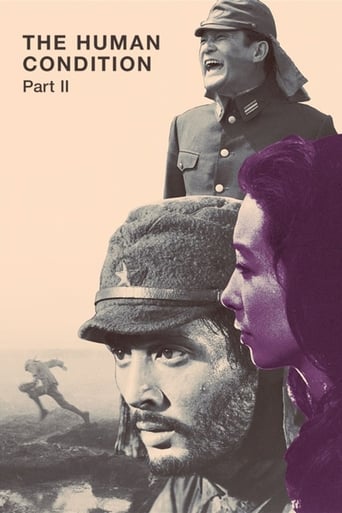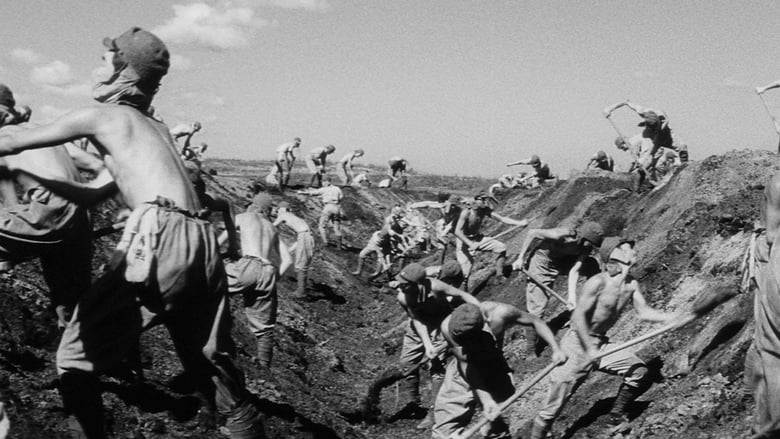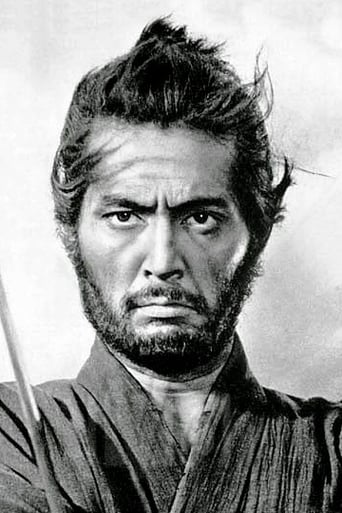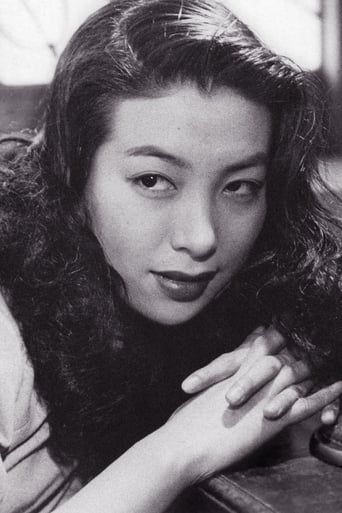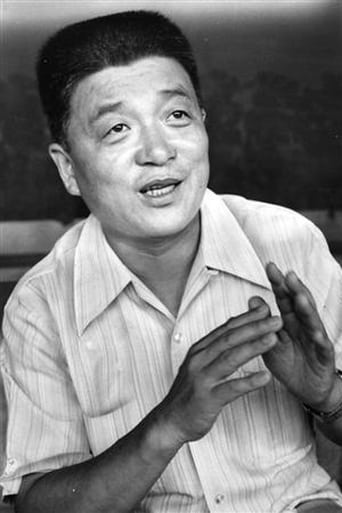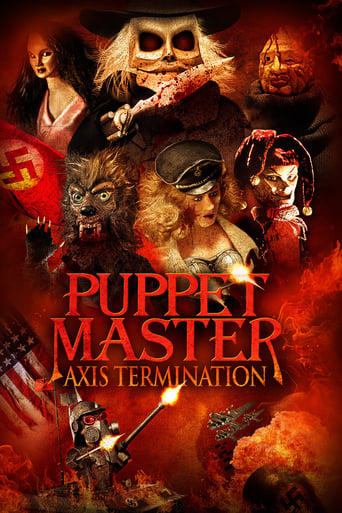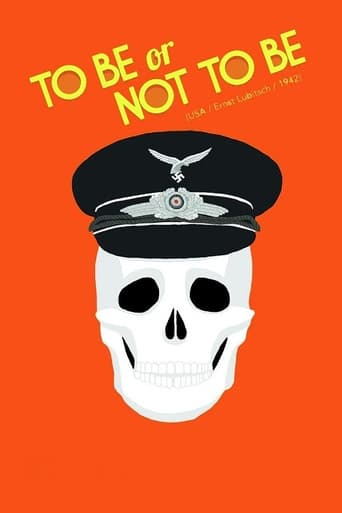The Human Condition II: Road to Eternity (1959)
Kaji is sent to the Japanese army labeled Red and is mistreated by the vets. Along his assignment, Kaji witnesses cruelties in the army and revolts against the abusive treatment against the recruit Obara. He also sees his friend Shinjô Ittôhei defecting to the Russian border, and he ends in the front to fight a lost battle against the Russian tanks division.
Watch Trailer
Free Trial Channels
Cast


Similar titles
Reviews
Entertaining from beginning to end, it maintains the spirit of the franchise while establishing it's own seal with a fun cast
Not sure how, but this is easily one of the best movies all summer. Multiple levels of funny, never takes itself seriously, super colorful, and creative.
I didn’t really have many expectations going into the movie (good or bad), but I actually really enjoyed it. I really liked the characters and the banter between them.
Great movie. Not sure what people expected but I found it highly entertaining.
Kaji is sent to the Japanese army labeled of Red and is mistreated by the vets. Along his assignment, Kaji witnesses cruelties in the army; he revolts against the abusive treatment spent to the recruit Obara that commits suicide; he also sees his friend Shinjô Ittôhei defecting to the Russian border; and he ends in the front to fight a lost battle against the Soviet tanks division. "The Human Condition – Parts III & IV" is the first sequel of the anti- war masterpiece by Masaki Kobayashi. The story is impressively realistic and magnificently shot with top-notch camera work, giving the sensation of a documentary. But maybe the most impressive is to see the treatment of the Japanese military with their soldiers. If they treated their own compatriots with such brutality, imagine how the enemies would be treated? My vote is ten.Title (Brazil): Not Available
This is the second of three films that make up "The Human Condition" trilogy. The extremely long films are based on an extremely long set of novels (in six volumes) by Jumpei Gomikawa. The books are about the journey of a man named Kaji who is simply born at the wrong time and place. His ideas about the worth of the individual and the humanity of mankind fly in opposition to the militarism of WWII-era Japan. And, not surprisingly they get him in lots of trouble. In the first film, he's assigned to be the production manager at a mine that is worked by prisoners--and the people in charge couldn't care less about how many of them they kill in the process. But Kaji's humanistic ideals are put into action instead and at first they are very successful. But the military men hate him and when he stumbles, they attack him like wolves.Here in part II, Kaji's been drafted and sent to basic training. He's seen as a trouble-maker because of his experience at the labor camp, but Kaji is a great soldier. And, unlike the average soldier in the company, he cares about the individual. So, when recruit Obara is beaten and humiliated, Kaji is the only one who sticks up for the guy--although with only one man supporting him and the rest tormenting him, what happens next isn't at all surprising--Obara kills himself. The soldiers in the unit are actually pretty happy about this--Obara was a weakling. But Kaji refuses to back down and fights his superiors, as he is fighting for what is right--and brutalizing and disregarding a weak individual is wrong.Later, Kaji manages to be promoted and he's placed in charge of a group of older recruits (as the war is going badly, they began bringing up less and less fit men to serve). He refuses to brutalize his men and the leaders of the older veterans beat Kaji up regularly. He refuses to fight back--sort of like Gandhi. Again and again he's beaten and again and again he does nothing. And, he tries to protect his men as much as he can.Later, when the war is all but over, Kaji is sent along with other ill-prepared men to meet the Russian army and their tanks. And, after this slaughter occurs, the movie ends...and Kaji is left alive on the battlefield.Much of the film seemed to be a criticism on the pointlessly brutal system where underlings were beaten for no reason whatsoever by their immediate superiors. The officers did nothing to change this and Kaji still refuses to bend to this insane situation. Instead of training focusing on teamwork and camaraderie, it's based on destroying the weak and empowering the amoral. All in all, a depressing but well made indictment on the Japanese militaristic mentality of the day. If you are looking for a similar sort of film, try finding "Fire on the Plains" (also 1959) or "The Burmese Harp" (1956). Well worth seeing.
Or, as with the Lord of the Rings books, part III and IV.Here is featured Kaji's military exploits in boot camp and the Manchurian front. As predictable based on the previous movie, Kaji beats heads with the military and comes out worse for wear from it. The better side of these movies is Kaji's critical thinking and intelligence, but this time around he makes some pretty foolish decisions considering that at this point he is not only without power, but completely suspect. Nevertheless, our headstrong hero manages to protect his everyman principles and save a few trainees from being severely beaten at boot-camp--this time largely by taking the beatings himself. I have to admit, there's only so many times you can watch Kaji getting beaten up before you begin to think that it's all getting pretty ridiculous. Not a whole lot was gained by his actions this time around for the amount of pain and humiliation he endures.A particular subplot of note involves the mentally unstable Obara, a Japanese Pvt Pyle from thirty years before Kubrick's Full Metal Jacket, who meets a very similar fate. In fact, it's pretty certain that Kubrick saw this movie, though the effort may have been returned considering that some of the later battle scenes in this movie seem right out of Paths of Glory, which was made three years before this one. Of course, my Kubrick comparisons may simply have something to do with Kobayashi's widescreen compositions, where every amount of positive and negative space is used to careful, calculating effect.Meanwhile, the prolonged battle sequences at the end of Part IV are something unto themselves. After the long and political journey we've taken through Japanese nationalism and its corruption, Kobayashi doesn't shy in the least bit from showing dismembered limbs, blown up bodies, and madness taking away men's lives. And it's interesting to see that Kaji, no longer in a place to stand up to authority, no longer has the ability to control his own madness.These two parts are slightly looser than the first third of The Human Condition. A long sequence involving a hospital stay sticks out like a piece from a different puzzle especially, in what is for the most part a carefully crafted novelistic film. Not a whole lot is added by Kaji's experiences in the hospital except for a simple set-up of a later relationship and the death of a corrupt PFC. Of the entire 7hrs30mins the complete movie has run so far, I do believe a fair bit of Part III could have been cut out.So now we are left with Kaji's newfound guilt and battle experience as he becomes a POW to the Russians. Considering how ineffective he was at creating positive change in this second third as opposed to the first third, it's not looking like he's got a whole lot of ground left to stand on, and now he has to seriously question himself as well.--PolarisDiB
The Human Condition isn't an easy trilogy; it offers up tons of questions that even today have extreme relevance, particularly about man's duty to himself, to love and family, to country, to affiliation by an Emperor or Dictator, and what it is that's so insane about men in the staggering pit of hell known as war. As one can see in the second installment, The Road to Eternity, even what should be simple in a conventional war movie is turned just a bit to see the ugliness underneath. The first half of the film is Kaji, the trilogy's protagonist, in basic training and witness to more brutality towards the weak Obara (very well cast Kunie Tanaka) who commits suicide following a string of humiliations that are like Private Pyle squared Japan WW2, and how Kaji comes to grips with being a very good, disciplined soldier- the likes of which the army wants to control as they promote him- and, crucially, his last night spent with his wife Machiko (very tender performance from Aratama).The second half is Kaji off on the front lines, leading up to a big, climactic battle between Soviet and Japanese forces, which is a total horror. Although Kobayashi only goes so far to make these battle scenes dynamic (that is compared to today's battle scenes, which have far more money and just a smidgen more gore to work with), it's overall another incredible accomplishment, as story and character matter always more-so than grandiose visuals or pomposity. We see Kaji going through another level of change, as he's stripped of his "exemption" status and is now just another grunt in this rigidly regimented military, and where, as is expected but no less mortifying, the Japanese see no sign of victory despite all signs pointing otherwise.As in the first film, Kobayashi delivers moments of beauty, almost at times without trying. I absolutely was floored when the prairie fire scene turned into a desperate chase between Kaji and an escaping Shinjo, where what could have been a basic chase incorporated the fire and smoke and mud-piles into something else entirely. Or, indeed, little moments that suddenly make one's mouth agape, such as the freak-out from a soldier in the midst of the battle foaming at the mouth. If a few scenes might appear to be of the conventional sort (at least as much as Kobayashi would ever allow in this iconoclast approach), they're off-set by the wonderful performances, not least of which by Nakadai. Again he gives it his all, and matures just a little more, and displays a kind of bridge that Kaji is on between the kind-hearted but firm ways of No Greater Love and the, dare I say it, near bad-ass persona in Soldier's Prayer.It's another great entry in an impeccable trilogy, if maybe not quite as awe-inspiring as the final film.

